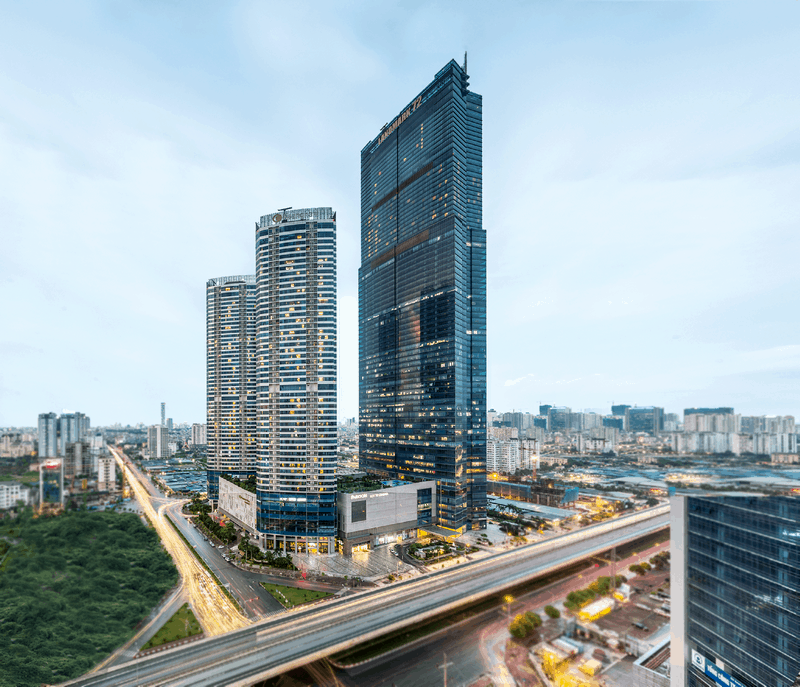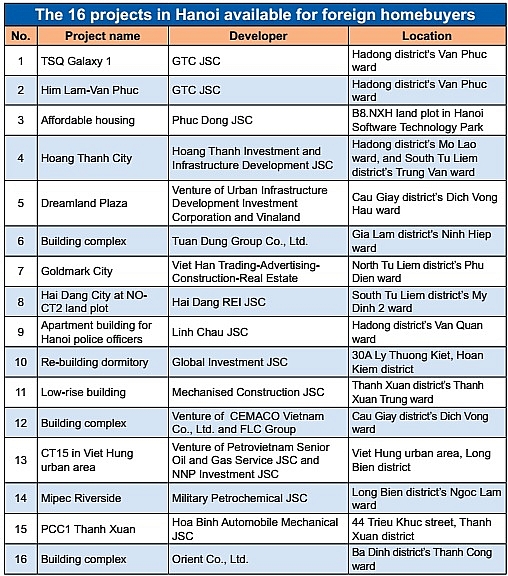
Working at a tech firm for several years in Vietnam, South Korean man Jung Jae Yun is looking for an apartment to stay for the long term.
He was very happy to see the list of 16 commercial-housing projects for foreigners recently released by Hanoi’s Department of Construction, and has already begun selecting a place for himself. “Apartments in Hanoi are much more affordable than in Seoul. I will choose a project not too far from my company,” Yun told VIR.
A convenient location and the quality of projects are two of the most important factors for foreigners when they are deciding on a house in the country.
According to Yun, Vietnam's real estate has attracted customers with impressive prices and high profit potential as well as high quality provided by a strong lineup of prestigious developers.
In addition, the country is also creating favorable conditions for foreign customers to own real estate in Vietnam.
Apartment prices in Ho Chi Minh City and Hanoi are still lower than other cities in the region such as Kuala Lumpur and Bangkok. The average price of a new house in the center of Ho Chi Minh City is about $5,500-$6,500 per square meters, only a portion of what is charged in Hong Kong.
In short supply
According to a report from real estate firm CBRE’s fifth annual Global Living report analyzing property markets across 35 cities, the average price of a home in Hong Kong in 2019 is more than $1.2 million. The low real estate tax in Vietnam is also another point attracting both domestic and foreign buyers, especially since the country opened its gates to foreign investors.
Talking to VIR about the housing trends for foreigners, a representative of CenLand, the biggest real estate brokerage in northern Vietnam, said that foreign demand for buying or leasing houses is large because of the increasing foreign-invested capital in Vietnam, especially from Japan and South Korea.
“A great many foreigners bring their families to Vietnam and they want accommodation which is within easy reach of their workplace, schools, and shopping destinations. Almost all of them are Japanese and South Korean people who are fastidious, thus the quality requirements are strict. Also, supply in the premium segment is always lower than demand,” she said.
“While that demand is high, we do not expect transaction volumes to soar because foreign buyers have a strong preference for projects invested by reputable property developers like Sun Group and Vingroup – who have not registered a single project on this current list,” she added.
According to a survey from DKRA Vietnam, 23.5 per cent of clients prioritize the image of developers, 14.8 per cent pay attention to sales policies like price and promotions, 15 per cent of them choose houses by their design, 12 per cent decide by location, and 12 per cent by the amenities available.
Hanoi's move to publish the list of 16 commercial-housing projects safe enough from a national security and defense perspective to sell to foreigners is a step towards accommodating non-nationals who wish to lay down a more permanent future. These schemes cover most segments, from affordable to mid-end and high-end properties.
One of them is a super-premium project developed by Global Investment JSC in the center of Hanoi's Hoan Kiem district with a unit price of around VND250 million ($10,870) per square meter.
Other projects like Dreamland Plaza in Cau Giay district, Goldmark City in South Tu Liem district, and Mipec Riverside in Long Bien district are in the secondary segment with unit prices of VND30-50 million ($1,300-$2,170) per square meters. Some of them are premier projects located in Gia Lam district and Long Bien’s Viet Hung urban area.
However, in the opinion of Truong Anh Tu, director of Business Development at Phuc Khang Construction and Investment JSC, more than half of homebuyers decide based on the reputation of the developer, followed by commitments of profit, location, and services.
This does not bode well for the 16 projects currently listed by the capital, as they lack reputable developers and most of them are far from administrative centers and office areas.

Legal hurdles
The high foreign demand for home ownership in Vietnam is understandable as every year more and more foreign companies are setting up shop in the country. It also shows that the recent changes to the legal framework on property ownership have managed to make foreigners feel more assured in their decision to buy homes here.
According to the representative of CenLand, “Publishing this list will not impact market liquidity because of the existing legal barriers. Notably, Vietnam has a legal framework allowing foreigners to buy and own property in the country." However, he added, there are obstacles in the form of the language and administrative procedures.
“Besides that, the corpus of laws, decrees, and circulars related to property trading is quite extensive and foreign buyers often do not know all of the country’s laws,” he said.
Yun said regulations are so complex in Vietnam that he needed to enlist a real estate consultant to conduct his purchase.
Article 76(2) of Decree No.99/2015/ND-CP offering guidance on the Law on Housing shows that foreign entities eligible to own houses in Vietnam may only purchase or lease-purchase houses from owners of housing construction projects, or purchase houses of foreign entities specified in Article 7(4b) of the same decree, and may only receive houses as “inheritance of gifts from households or individuals”, or receive houses as gifts from organizations, provided the number of foreign-owned units stays below the limit specified in Article 76(4).
Regarding this regulation, Tran Duc Phuong, a representative of the Ho Chi Minh City Bar Association, said that certain phrases are not absolutely clear in their legal meaning, and so foreigners are under the misunderstanding that they are only allowed to buy houses from investors, which only applies for unfinished apartment projects under development.
In addition, some foreigners believe that they are only permitted to buy houses which have a certificate of ownership, while receiving the house purchase contract of a project planned to develop in the future is not legally binding. Meanwhile, in reality, these two transaction are the same.
Foreign entities may own up to 30 per cent of the total number of units in an apartment building. In an area whose population is equivalent to that of a ward, foreign entities may own up to 30 per cent of apartments in each building.
“The 30 per cent limit is quite low compared to the demand of foreigners in Vietnam. In general, in high-end projects, the ratio is hit in short order, while in the mid-end segment, fewer units are purchased than permitted,” said Matthew Powell, head of the Hanoi and Danang offices of Savills Vietnam. “Thus, in my opinion, Vietnam should adjust this ratio by increasing it in high-end projects and decreasing it for mid-end ones.”


















